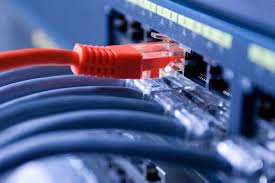Në botën e sotme hiper-të lidhur, debati mes teknologjive me kabllo dhe atyre wireless është më i rëndësishëm se kurrë. Ndërsa lidhja wireless ofron lehtësi të pakrahasueshme, teknologjia me kabllo mbetet standardi i artë për sigurinë. Nga integriteti i të dhënave deri te ekspozimi i reduktuar ndaj kërcënimeve kibernetike, ja pse lidhjet me kabllo e tejkalojnë wireless-in në aspektin e sigurisë.
1. Kërkohet Akses Fizik
Një nga avantazhet më të mëdha të teknologjisë me kabllo është varësia e saj nga lidhjet fizike. Ndryshe nga rrjetet wireless, të cilat transmetojnë sinjale nëpër ajër, lidhjet me kabllo kërkojnë një lidhje direkte me rrjetin. Kjo nënkupton:
- Pa ndërhyrje në ajër: Hakerët nuk mund të kapin të dhëna pa akses fizik në kabllo ose pajisjen e rrjetit.
- Pikat e kontrolluara të aksesit: Pikat e hyrjes janë të kufizuara vetëm aty ku kabllot janë të arritshme fizikisht, duke e bërë më të lehtë sigurimin e rrjetit tuaj.
Ndërkohë, rrjetet wireless transmetojnë sinjale që mund të kapen nga distanca, duke ekspozuar rrjetin ndaj një game më të gjerë sulmesh.
2. Imunitet ndaj Interceptimit të Sinjalit
Teknologjia wireless transmeton të dhëna nëpër frekuenca radio, duke e bërë të ndjeshme ndaj spiunimit. Teknikat si packet sniffing dhe man-in-the-middle (MITM) lejojnë kriminelët kibernetikë të kapin dhe manipulojnë të dhënat gjatë transmetimit.
Rrjetet me kabllo, nga ana tjetër:
- Transmetojnë të dhëna përmes kabllove të mbrojtura, duke reduktuar rrezikun e interceptimit.
- Nuk janë të ndjeshme ndaj rrjedhjes së sinjaleve, duke siguruar që të dhënat mbeten brenda kabllos.
3. Rrezik i Ulët për Akses të Paautorizuar
Rrjetet wireless janë të prirura ndaj aksesit të paautorizuar përmes fjalëkalimeve të dobëta, protokolleve të vjetruara të enkriptimit ose konfigurimeve të gabuara. Edhe me protokolle të forta si WPA3, mund të ekzistojnë dobësi.
Rrjetet me kabllo e reduktojnë këtë rrezik duke:
- Kërkuar lidhje fizike për të fituar akses.
- Bërë të pamundur për sulmuesit të lidhen në rrjet në mënyrë remote pa kaluar më parë sigurinë fizike.
Kjo i bën konfigurimet me kabllo veçanërisht të përshtatshme për mjedise që kërkojnë nivele të larta sigurie, si agjencitë qeveritare, institucionet financiare dhe qendrat e të dhënave.
4. Pa Interferencë apo Bllokim Sinjali
Sinjalet wireless janë të ndjeshme ndaj interferencës nga pajisje të tjera, pengesa mjedisore ose sulme të qëllimshme jamming. Këto mund të:
- Ndërpresin komunikimin.
- Hapë derën për sulme denial-of-service (DoS).
Rrjetet me kabllo janë të imunizuara ndaj këtyre problemeve. Transmetimi i të dhënave përmes kabllove nuk ndikohet nga interferenca e jashtme, duke siguruar komunikim të qëndrueshëm dhe të sigurt.
5. Integritet i Përmirësuar i Transferimit të Të Dhënave
Rrjetet wireless shpesh përjetojnë humbje paketi për shkak të interferencës, distancës ose pengesave, duke rrezikuar integritetin e të dhënave. Rrjetet me kabllo ofrojnë:
- Shpejtësi të qëndrueshme: Të dhënat rrjedhin direkt midis pajisjeve pa interferencë.
- Transmetim pa gabime: Cilësia e sinjalit nuk degradohet në distanca të shkurtra dhe mesatare, duke siguruar integritetin e informacionit të transmetuar.
6. Menaxhim i Thjeshtë i Sigurisë
Sigurimi i një rrjeti wireless përfshin konfigurimin e enkriptimit, vendosjen e firewall-eve, menaxhimin e listave të aksesit dhe përditësimin e firmware-it për të gjitha pajisjet e lidhura. Rrjetet me kabllo janë më të thjeshta për t’u menaxhuar:
- Pajisjet e lidhura me Ethernet trashëgojnë sigurinë e rrjetit pa nevojë për konfigurime shtesë.
- Nuk ka sinjale për të mbrojtur, pasi nuk transmetohen.
Kjo i bën rrjetet me kabllo më pak të ndjeshme ndaj gabimeve në konfigurim, një burim i zakonshëm i dobësive.
7. Mbrojtje Kundër Kërcënimeve Wireless në Zhvillim
Ndërsa teknologjia wireless evoluon, po rriten edhe metodat e sulmeve. Nga pajisjet Wi-Fi Pineapple që imitojnë rrjete legjitime deri te teknikat e avancuara phishing për pajisjet mobile, siguria wireless mbetet një sfidë e vazhdueshme.
Rrjetet me kabllo, duke qenë më pak të varura nga protokollet wireless në zhvillim, janë natyrshëm të mbrojtura nga këto kërcënime.
Ndërsa teknologjia wireless është e domosdoshme për lëvizshmëri dhe lehtësi, teknologjia me kabllo spikat për sigurinë superiore. Mungesa e dobësive në ajër, ekspozimi i reduktuar ndaj interceptimit dhe kërkesa për akses fizik e bëjnë lidhjen me kabllo zgjedhjen më të sigurt për organizata dhe individë që prioritet kanë mbrojtjen e të dhënave.
Për operacione të ndjeshme — qoftë menaxhimi i të dhënave konfidenciale, sigurimi i komunikimeve qeveritare, apo garantimi i performancës së rrjetit — teknologjia me kabllo mbetet opsioni më i sigurt dhe i besueshëm. Në një botë ku kërcënimet kibernetike janë në rritje, stabiliteti dhe siguria e një lidhjeje fizike ofron qetësi që rrjetet wireless shpesh nuk mund ta sigurojnë.
© 2025 | Krijuar me Inteligjencë Artificiale (AI)




